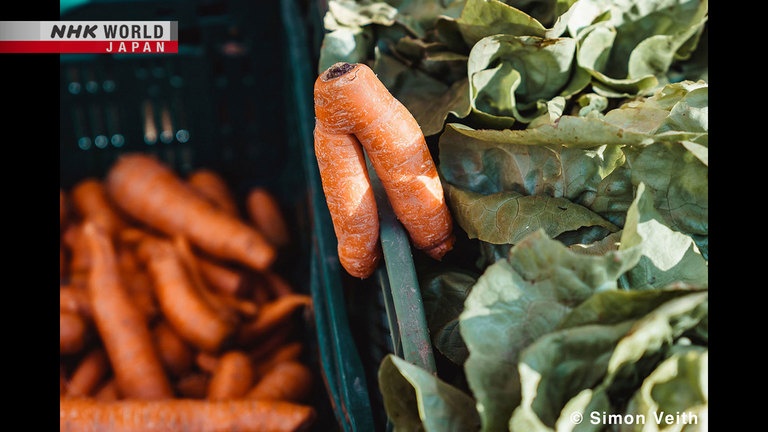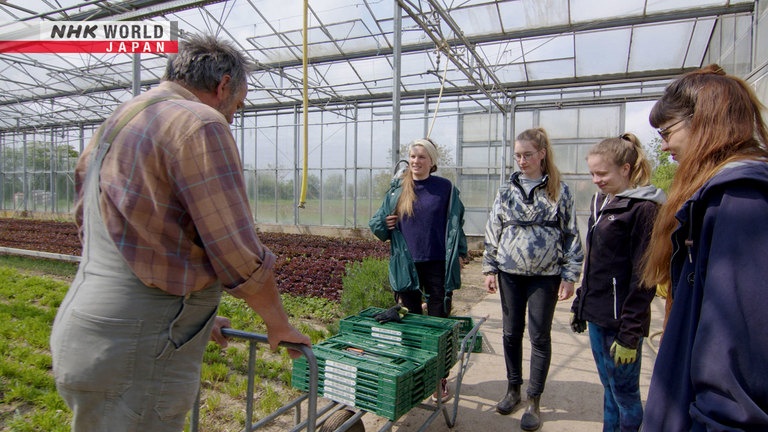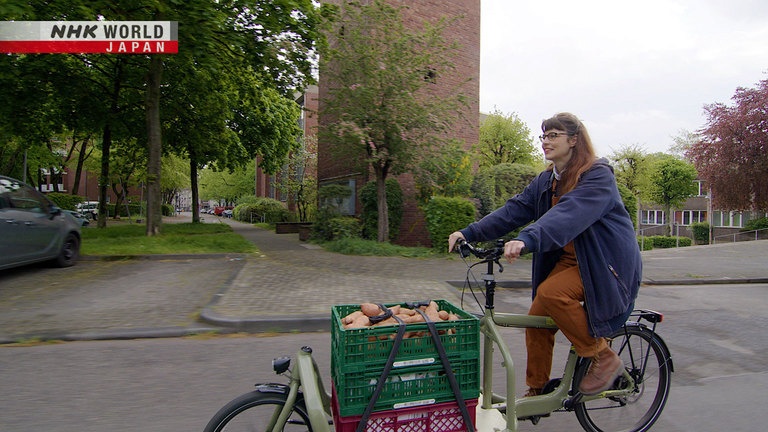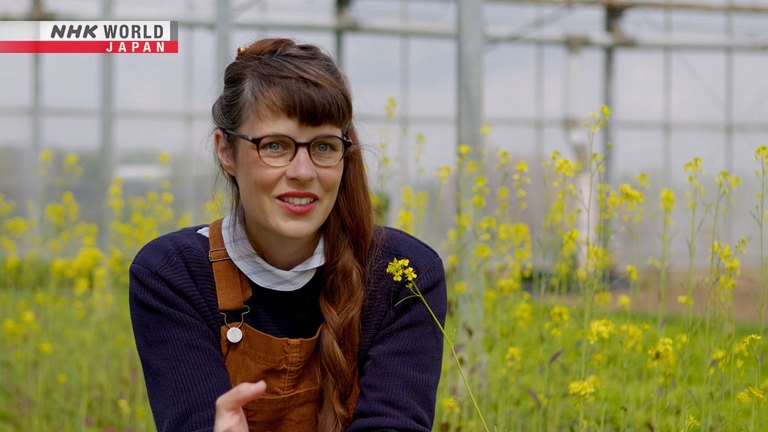Giving Food Waste a Chance: Nicole Klaski / Founder of The Good Food
Food waste is a major problem. A founder of a non-profit in Germany is tackling the issue by rescuing food destined for the dustbin.




Transcript
Direct Talk
This might look like an ordinary bunch of
fruit and vegetables, ready to be eaten.
But though they are still edible,
they've passed the best sell by date.
That means many supermarkets
would throw them away.
In Germany alone,
18 million tons or 720,000 truckloads of food
are wasted every year.
Nicole Klaski is tackling this issue
in the German city of Cologne.
She's founded the company,
The Good Food, a non-profit organisation.
It rescues and sells food
that falls outside of commercial standards –
but is still edible and nutritious.
While I started working on it
and through that, I learned that
people can change their behaviors
and that there is hope for a better world,
if you want to say that.
go out to farms and supermarkets
to collect rejected fruit and vegetables,
so they can sell them in their own stores.
Nicole told us
how she is helping people
rethink the food cycle.
I realized we waste so much resources
when we waste food.
And I thought, this is the easiest part to do
something against all this waste of resources
in saving and rescuing the food.
If it's clothes or resources or food,
it's not good to waste anything.
Nicole rescues food
that's passed its sell by date.
But she also saves crops discarded by farmers
because they don't meet
supermarket standards for shape and size.
Because you know, usually it's thrown out
or it's going to be left
to rot on the fields.
But now I have to think about,
oh, is it still worth something?
And obviously it is
because, you know, we can eat it
and we can nourish ourselves with it.
Nicole was born in a small town near Cologne
to a taxi driver father
and a mother who worked
in a large clothing store.
She grew up far from farmland,
in a typical German suburban household.
To be honest,
my childhood was very privileged,
so we had everything we needed.
So there was no realization of
what's happening in the world.
So I was not really acting like
being confronted with all the issues
that we have in the world.
And I think the lessons
learned really only happened
when I was in Nepal or Bangladesh
and when I really had a broader mind
and my eyes could actually see
what was going on in the world.
Nicole went to graduate school in
Perth, Australia to study human rights.
And one encounter there
would shift the course of her life.
A classmate from Bangladesh
got her interested in an
NGO in Kathmandu, Nepal,
that protects the rights of local people.
In Nepal, I worked at an NGO
we were trying to
strengthen their traditions.
And with a background from
what I've just learned in Nepal,
where people sometimes don't have enough food
and they don't have clean water to drink,
it just felt so idiotic to waste
all these resources here.
So when I came back to Cologne from Nepal,
I realized how much food we waste
because I saw into the garbage bins
from the supermarkets.
We took out the food and we ate it
because surprisingly,
the food was still really, really fine.
It wasn't messy at all.
You know, in my imagination,
what we throw out would be sticky and yucky
and we don't want to eat it.
But this is not the case.
The food was really good.
so I felt that I really have to do
something against this food waste
because we don't only waste this food,
we also waste all the resources
that have gone into the food.
Let's say if we waste the apple,
we also waste the water that has to be,
you know, needed to be for the tree to grow
and all the work that has to flow into
the apple until it blooms, until it grows.
Nicole felt driven to address this problem.
So she joined an association
called foodsharing,
founded in Cologne in 2012.
Volunteers collect wasted food
from Cologne stores and residents,
and distribute it.
Bearing the cost of transport and fuel,
the volunteers offer the food
on stalls around the city
so people can pick it up for free.
Nicole got heavily involved
and shared the vision.
She also saw the project's limitations.
It's always a little bit difficult
because the organization's goal is to do
as much as possible without money.
And this was actually
also the point when I realized
only little money can move so much more.
You know, you can see the warehouse here
and we can store and accept
a lot more food on pallets,
and we can order trucks and we can pay them.
You know, the warehouse needs to be paid
with this little bit of money.
And that's when I realized,
okay, we need to do something else
than foodsharing, you know.
And that's when I founded The Good Food.
With a foodsharing collaborator, Ines Rainer,
Nicole started a business in 2015.
They called it The Good Food.
They also began to collect food
destined for the garbage can.
But instead of giving it away for free,
Nicole changed the approach.
The Good Food sold the food
at a discounted price.
For the first six months they secured
office space through local support.
But they couldn't yet set up their own store.
Instead they sold food at street markets
and pop-up stores at first,
to see how customers responded.
So we knew that
at the end of those two months,
we needed money to pay for the shop.
So that was the first time when
there was a little bit of pressure on us.
But it worked out fine,
so it was motivating enough
to keep looking for something longer.
And then in February 2017,
the landlords of this shop,
they actually came to me
and they said, oh, can you come
and open a shop in our house?
And I said, You mean constantly,
you know, permanently?
And they said, Yes, that would be great.
And I came here and I looked at the shop
and I fell in love straight away.
It's really small.
And I thought maybe, maybe we can make it.
And because the people who own this,
they are really fair to us
and they help us enormously.
So that's why we were able to move here
and to open the shop here.
Gradually, the project took off.
With the revenue,
Nicole pushed for a larger
and more sustainable organisation.
She hired employees and trucks,
rented warehouses to store food,
and opened more stores.
Coming from the background of foodsharing,
doing everything for free,
it was kind of difficult for me to say,
okay, I need to earn my living
with The Good Food.
But The Good Food came to a point
where it was necessary
because I was not able to do another job
because The Good Food grew so much.
And that's when we started
to pay our salaries.
And I feel this is sustainable.
That way we can rescue even more food.
One positive result of this growth
was an important encounter,
back when Nicole was still preparing
to open her first store.
That's when she met Heinrich Hannen,
a.k.a. Heiner, a farmer from the region.
The fourth generation manager
of his family farm,
Heiner converted it to organic farming.
Now he produces 50 types of organic crops.
I met Heiner at
one of his harvesting events.
He organizes it for thousands of people.
They come here and they harvest all the
fruits and vegetables he can't sell anymore.
And I was saying to him,
Wouldn't it be nice
if we could come every week
and collect all the fruits and vegetables
that you leave on the fields,
because otherwise they will go and rot.
And he said, Yeah, you can try.
You're welcome to come back.
And that's what we did.
And so from 2014 onwards,
we come here every week.
Under EU marketing standards,
crooked or blemished crops
are labeled Class Two,
and sold more cheaply.
That's even though they're just as tasty
and nutritious as Class One goods.
However, many farmers have no choice
but to throw them away.
Class Two crops must be sold more cheaply,
but they still cost the same
in terms of labor and transportation.
That means a big loss for farmers.
This is a problem Nicole is tackling head on.
Together with her staff,
she has been harvesting,
transporting, and selling
these Class Two foods herself.
It was a big success.
The Good Food is now
a non-profit organisation
with 4 paid staff,
183 volunteers,
and 3 stores.
Every week more people get in touch,
keen to get involved.
The vegetables sold from our farm
can feed about 5000 people.
That's a huge amount of people.
- Just from your farm?
- Yes, just from our farm.
If I worked with more organizations
like yours
we'd be able to feed 3000 more people
with fresh vegetables.
That's already a huge output.
Organic farmers are often told that
we cannot feed the world.
But if we used all our resources,
we could feed the world, no problem.
I feel really proud
because we have established all this.
Nicole has adopted a unique payment system
at The Good Food.
That's because she wants buyers
to think more about the value of food.
So our payment system is pay as you feel,
which says in German
“Zahl, was es dir wert ist.”
So the customer has to
define the price themselves,
which is not always easy
because we kind of forget
how much worth the food is.
We are so used to going into
regular supermarkets
and pay whatever it says
and we don't ask if it's right or wrong.
And here people have to think about this.
And I feel this is a really good,
good practice to do.
People who come here, families who come here,
and to children who teach their parents
that the nice carrots with the two legs
are a lot yummier than the straight carrots.
And I really like that idea as well
that some children learn how
fruit and vegetables actually look like,
and that they are not as clean and stylish
as we see them in a regular supermarket.
That's not the reality.
And here you can see the reality.
And from that small age,
they learn not to waste food.
And it's brilliant.
Nicole's work, beyond its practical benefits,
also has a big potential for education.
So our first goal was to rescue food.
That was it.
But when starting to work,
I realized it's not only this.
We also educate a lot of people
and not only our team customers
or even our partners.
You know, they all benefit from it
because our team benefits from it,
because it learns a lot about nature,
about how to harvest, and how to...
how much work is in your food,
you know, and how we should cherish our food.
I think it's really worth it to learn this
because then we don't waste
the food if we know
how difficult it is to harvest it.
Finally, we asked Nicole
if there are some words
to best describe her life's work.
So my motto is
reduce,
reuse
and recycle.
And the 3Rs.
I think we should reduce what we consume
because every consumption needs resources.
And I think we already use so much resources.
And I think we should just reuse
everything that's already existing
and that saves lots of resources as well.
And then if we use something,
we should recycle it.
The long term goal
is that we are not necessary anymore
because we want to stop food waste.
And if we have stopped food waste.
Then The Good Food is not needed anymore.
So then we are done.
But I think until then
we need to have little smaller goals.
And then till then we want to
rescue as much food as possible
and maybe open even more shops.
That might be a nice idea.
And then work on our logistics.
And maybe one day we can also work on
our network with cafes and restaurants
and the gastronomy.
Maybe they can start cooking
with crooked food
and their food will be
even more delicious then.